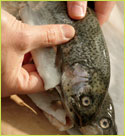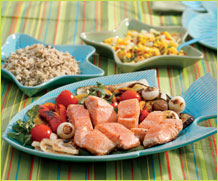Grill up an easy summer supper with this salmon recipe.
Looking for a quick, healthy, and delicious summer supper? Try grilling fish. Whether you choose salmon, halibut, tuna, bass, or another variety, here are the basics for choosing, preparing, and grilling fish. And be sure to try our recipe for grilled salmon with citrus salsa.
 Pick your fish
Pick your fish
Ready to grill? Follow these tips for picking the freshest fish:
Smell it. Fish should not have a pungent aroma, especially fillets.
Touch it. If the fish is packaged, press your finger into it. (If it is unpackaged, ask the person selling the fish to do so.) The indent should disappear.
Look at it. Is there any liquid on the fish? If so, it should be clear, not milky. Milky liquid is the first sign of rot. If you're buying a whole fish, the scales should be bright and metallic, the eyes should be clear, and the gills should be bright red. If choosing a fillet, avoid any with darkening or drying around the edges.
Grilled salmon with citrus salsa
One popular fish for grilling is salmon, which is loaded with heart-healthy omega-3 fatty acids. Here's a quick, easy recipe for grilled salmon with citrus salsa. Serve it with wild rice and grilled vegetables. You can use the grilling instructions to make just about any fish, although you may need to adjust cooking times depending on its thickness.
Serves four
Ingredients
4 salmon filets, 4 ounces each
2 oranges, peeled, sectioned, and cut into bite-size pieces
1 cup canned pineapple tidbits, undrained
¼ cup diced fresh mango
2 jalapeño peppers, seeded and minced
6 Tbsps. orange juice
2 Tbsps. diced red bell pepper
4 tsps. sugar
2 Tbsps. chopped fresh cilantro
Instructions
- In a bowl, combine all ingredients except salmon to make the citrus salsa. If you want a little less heat, use only one jalapeño. Refrigerate the salsa before using.
- Scrub the grill rack clean with a wire brush, and then rub with a small amount of canola oil. This will prevent the fish from sticking. The grill is ready when you can only hold your hand four inches from the grill for no more than three or four seconds.
- Salmon doesn't need a lot of flavor added, so just rub a little olive oil into the fish, and season with salt and pepper. Leave the skin on, because this will help the fish stay together.
- Turn your grill down to low, and put the fish on, flesh side down. Cooking times vary, but a one-inch thick filet will cook in about 8 minutes. Close the hood on your grill, and don't open it again until you're ready to flip it halfway through.
- The fish is ready when it flakes up easily with a fork. Carefully remove the fish with a thin spatula. Some skin may stick to the rack, so make sure you clean the grill once you're done cooking.
5 more ways to dress fish for grilling
- Mahi mahi with lemon juice, olive oil, thyme, and rosemary
- Rainbow trout with soy sauce, honey, balsamic vinegar, garlic, and olive oil
- Bass with sundried tomato spread and capers
- Halibut with lime juice, olive oil, parsley, cilantro, garlic, and jalapeños
- Tuna with teriyaki, olive oil, and garlic





